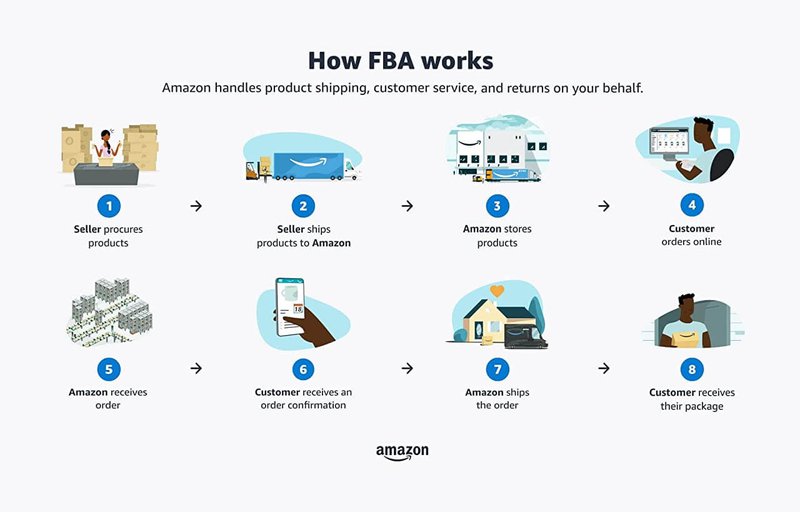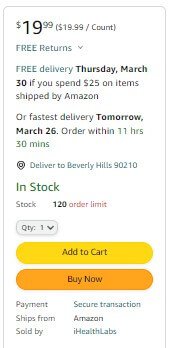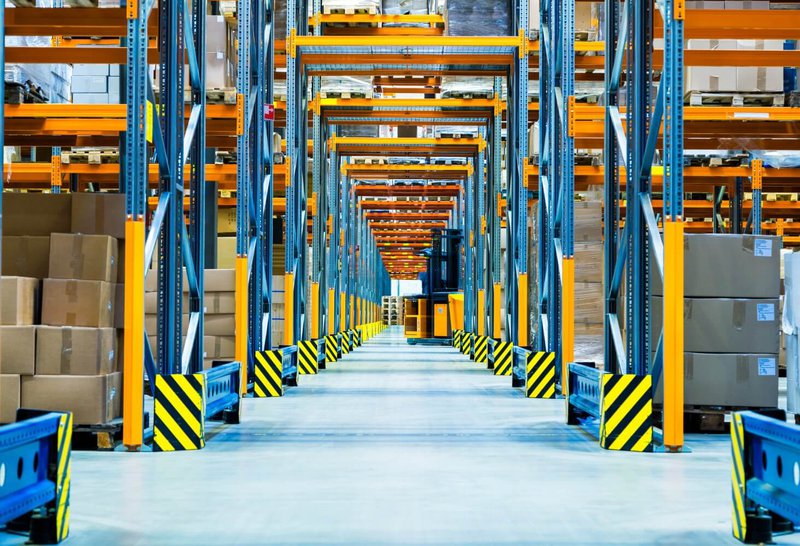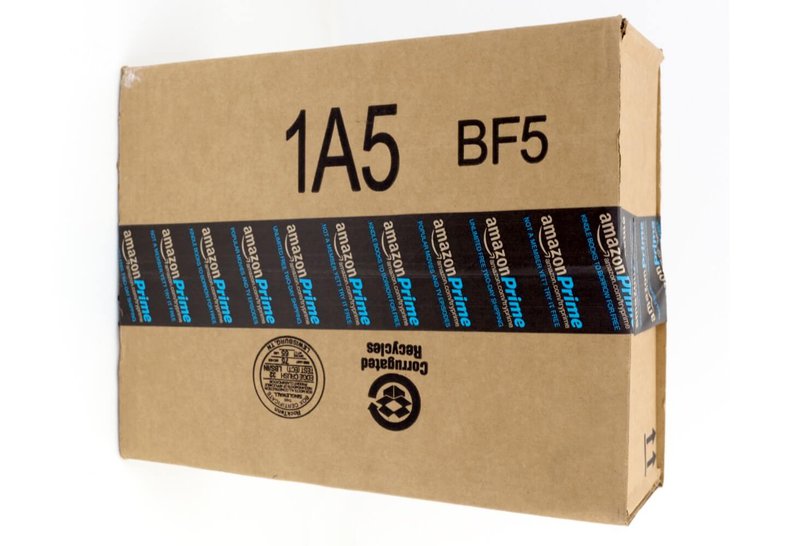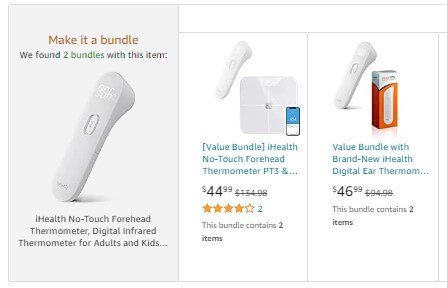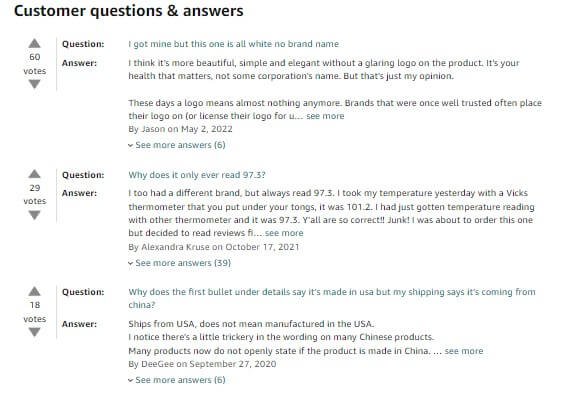Amazon FBA Fulfillment: Is It Right for You?
Fulfillment by Amazon (also known as FBA) can be a great option for sellers who want to take fulfillment off their shoulders. Read on if you want to see if FBA is right for your business too.
Updated November 7, 2024
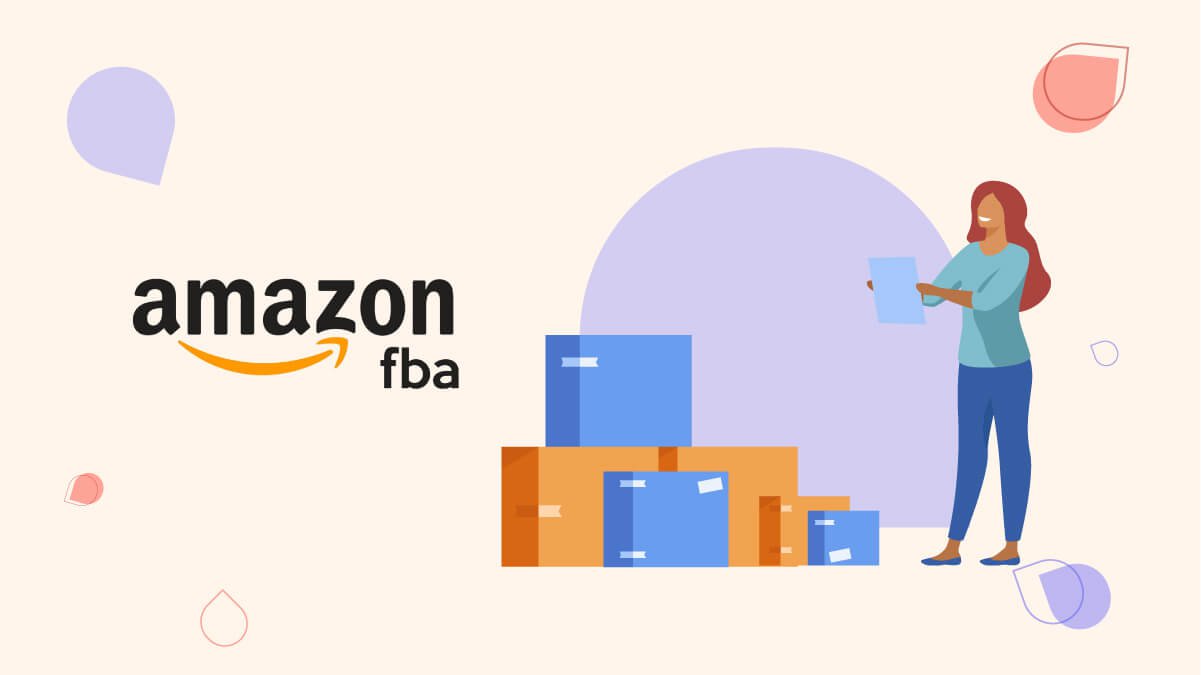
Have you ever wanted to outsource your order fulfillment, shipping, and customer service to a reliable third-party provider?
If so, then Amazon FBA (Fulfillment by Amazon) may beli the solution you're looking for. In this comprehensive guide, we'll explore everything you need to know about Amazon FBA, including how it works, its fees, benefits, and disadvantages, and expert tips on making the most of this tool.
Meet the expert
Mina is a multiple seven-figure seller in the supplement industry, investor, Amazon PPC expert, and founder of the Trivium Group, an Amazon Advertising agency. He has consulted over 400 brands and 3 aggregators worth $1.2 billion combined.
What is Amazon FBA?
Amazon FBA is a business model offered by Amazon that allows third-party sellers to store their retail arbitrage or private label products in an Amazon Fulfillment Center. When an order is placed, Amazon picks, packs, and ships the product to the customer on behalf of the Amazon seller.
Amazon FBA also provides customer service and handles customer returns. These features allow business owners to take advantage of Amazon's vast distribution network, which includes fast and reliable shipping options and access to Amazon Prime customers.
It’s one of the most groundbreaking features of the platform that made it stand out from its competitors and led it to becoming the largest marketplace in North America.
If you need guidance with your FBA eCommerce business, partnering with one of the best Amazon agencies can help your business scale. Their expertise can help you drive your eCommerce business to success.
How does Amazon FBA work?
Here's how FBA works in a nutshell:
- Sign up for Amazon FBA: As a seller, you can sign up for FBA through your Amazon seller central account.
- Send your inventory to Amazon: Once you have signed up for FBA, you can create an Amazon FBA shipping plan to send the inventory to an Amazon fulfillment center. Amazon will store your products and take care of the rest.
- Your products are listed on Amazon: Once they are in Amazon's fulfillment centers, they will be listed on Amazon's website along with other products.
- Customers purchase your products: When a customer purchases your product, Amazon will pick, pack, and ship the product to the customer.
- Amazon handles customer service and returns: Amazon's customer service network also handles customer queries and product returns on behalf of the seller.
Sellers can monitor their inventory and sales through the Amazon Seller Central dashboard.
What are the fees for Amazon FBA
Amazon FBA fees include storage, fulfillment, and optional service fees. While FBA fulfillment fees may seem higher than self-fulfillment initially, they can be cost-effective in the long run, especially for sellers looking to scale their businesses.
FBA fees are calculated based on the product's size and weight (per cubic foot), as well as the duration of storage in Amazon's fulfillment centers.
Firstly, you will be charged monthly storage fees based on the space your inventory occupies in Amazon's fulfillment centers. Secondly, you will be charged fulfillment fees per unit for the picking, packing, and shipping of your products to customers.
In addition to these item fees, Amazon also offers optional services such as labeling, removal, and multi-channel fulfillment, which incur additional fees.
Multi-channel fulfillment fees are charged if you have a shipping plan to fulfill orders from other sales channels, such as your website or a third-party marketplace.
What are the benefits of Amazon FBA?
Amazon fulfillment offers several benefits to online sellers. By outsourcing their order fulfillment, shipping, and customer service to Amazon, sellers can focus on other critical aspects of their business, such as product development and marketing, to increase their profit margins.
Access to free Prime shipping options
One of the top benefits of Amazon FBA is access to free Prime shipping options. Prime members can take advantage of Amazon Prime's free two-day shipping on eligible products, and FBA sellers can take advantage of this. This means that your products will be more attractive to Prime members, who are known to spend more on Amazon than non-Prime members.
Using Amazon’s customer service
Using Amazon's customer service can provide several benefits for Amazon FBA sellers. Since Amazon handles customer service and returns, sellers can save time and money by not dealing with these aspects of their business themselves. This frees up time for sellers to focus on other critical business areas, such as product development, marketing, and expanding their product offerings.
Additionally, Amazon's customer service is known for being responsive and efficient, which can lead to increased customer satisfaction and loyalty. When a customer has an issue with a product or order, Amazon's customer service team can quickly resolve the problem, often resulting in a positive experience for the customer.
This can lead to repeat business and positive reviews, which are crucial for maintaining a solid presence on the Amazon Marketplace.
Scale your business faster
FBA allows sellers to scale their business faster by using Amazon's vast distribution network. With access to Amazon's efficient and reliable shipping network, sellers can reach a wider audience quickly and efficiently. Amazon's shipping network includes same-day and two-day shipping options and access to Amazon Prime customers, which can be a significant advantage for sellers.
Furthermore, because FBA takes care of customer service and returns, Amazon business owners can help reduce customer complaints - and thus, increase customer happiness, positive reviews, and the likelihood of repeat business.
Using FBA can help Amazon sellers save time and money on order fulfillment and shipping costs, allowing them extra time to focus on other critical aspects of their business, such as product development and marketing. By outsourcing these aspects to Amazon, sellers can efficiently and cost-effectively handle their order fulfillment needs while still focusing on growth and expansion.
Cost-efficiency
According to Amazon, shipping with FBA is 32% less expensive per unit and 72% less expensive for two-day shipping than self-fulfillment. Amazon FBA can help sellers save money on storage, shipping, and customer service costs, making it a cost-effective option for businesses of all sizes.
Access to the Buy Box
The Buy Box is the prominent button on a product detail page that customers use to add items to their cart. It’s probably the biggest factor in improving your Amazon conversion rate.
When multiple sellers offer the same product, Amazon selects a seller to feature in the Buy Box based on various factors, including price, seller rating, shipping speed, and fulfillment method.
Sellers who use Amazon FBA have a better chance of winning the Buy Box because Amazon prioritizes its fulfillment service. FBA provides fast and reliable shipping and excellent customer service, which are key factors in winning the Buy Box.
Additionally, FBA sellers benefit from Amazon's Prime program, which grants free two-day shipping to Prime members. By using FBA, sellers can boost their chances of winning the Buy Box, leading to more sales and higher profits.
More storage space
One of the significant advantages of FBA for Amazon sellers is the access to more storage space than non-FBA sellers. Amazon has a vast network of fulfillment centers allowing sellers to store their products closer to their customers, leading to faster shipping times and higher customer satisfaction.
More storage space can help sellers scale their business more effectively by allowing them to hold larger inventory quantities. This means they can quickly replenish stock and fulfill orders faster, ultimately resulting in more sales and higher profits.
Amazon charges storage fees based on the size and volume of the products per cubic foot, so FBA sellers can adjust their inventory levels to keep their storage fees to a minimum.
Multi-channel fulfillment
FBA also offers multi-channel fulfillment, which allows sellers to ship products from other sales channels, such as their website or other marketplaces.
More freedom for you
FBA allows sellers to focus on other critical aspects of their business by outsourcing their order fulfillment, shipping, and customer service to Amazon. This can lead to more freedom and flexibility for the seller, enabling them to focus on product selection and development, marketing, and other critical aspects of their business.
Disadvantages of Amazon FBA
Amazon FBA does have some disadvantages sellers should be aware of. Some of the most notable ones include:
Higher Costs
Compared to Amazon FBM, FBA can be expensive, especially for long-term storage and oversized items. FBA storage fees can quickly add up, and sellers must factor them into their pricing strategy. Amazon FBA sellers must monitor their inventory levels and avoid storing excess inventory for extended periods to avoid fees.
Oversized items can also be more expensive to store with FBA, as Amazon charges additional fees based on the size and weight of the item. These fees can add up quickly, especially for large and heavy items, and may make FBA less cost-effective for sellers with oversized products.
Continuous inventory management
Using Amazon FBA requires ongoing inventory management. FBA sellers must keep a close eye on their inventory levels to ensure they don't run out of stock, which can lead to missed sales opportunities and dissatisfied customers. At the same time, sellers must avoid excess inventory, which can lead to increased storage fees and reduced profits.
To manage inventory effectively, FBA sellers must analyze sales trends, forecast demand accurately, and ensure proper storage of their products in Amazon's fulfillment centers.
This can be challenging, especially for FBA products with fluctuating market demand. FBA sellers can use Amazon's inventory management tools or third-party software to automate inventory management and avoid costly mistakes.
Fewer branding opportunities
When your products are shipped from Amazon's fulfillment centers, you have limited control over your products' packaging and branding of your products. Amazon's logo and branding will likely cover the shipping boxes used to transport your products.
This can make it challenging to create a unique and recognizable brand identity for your products, as the first thing customers will see is the Amazon branding.
While you may have control over your product packaging on the inside, the outside of the package is still an important part of your branding strategy. However, there are still ways to incorporate your private label branding into the packaging, such as using custom stickers or inserts to promote your brand and products.
Commingling
Amazon's inventory management system sorts products with the same manufacturer ID from different third-party sellers in commingled lots. This means similar products from different sellers may be pooled together in Amazon's fulfillment centers for faster and more efficient processing.
While commingling is designed to increase fulfillment efficiency for Amazon, it can have potential drawbacks for FBA sellers. One major concern is that their products may become mixed with low-quality items from less professional sellers, leading to negative reviews and a damaged brand reputation.
To avoid these issues, FBA sellers can opt out of commingling and keep their inventory separate from other sellers' products. This requires using unique product identifiers, such as UPC or EAN codes, to differentiate their products from others in the fulfillment center.
More returns
Sellers using Amazon FBA experience an increase in the number or frequency of returns due to Amazon's return policy, which allows customers to return products easily and without any hassle. This can frustrate sellers, as returns can impact their profits and inventory management.
Amazon handles returns processing and allows them to be sent directly back to the seller's facility. This can save time and money for FBA sellers, as they no longer have to deal with the logistics of forwarding returns from Amazon to their own facility.
To make the most of this new policy, FBA sellers should be prepared to handle returns efficiently and promptly. They can use analytics tools to track the number and frequency of returns and identify any patterns or issues with their products.
Very specific product guidelines
Amazon has a strict set of requirements for products entering their fulfillment centers. As an FBA seller, it's essential to ensure that your products are prepared correctly and follow Amazon's guidelines to avoid any issues or delays.
Amazon requires that all products are packaged appropriately to ensure safe transportation and storage in their fulfillment centers. This can include using specific packaging materials or adhering to specific product guidelines.
In addition, Amazon requires that all products have proper labeling, including barcodes and SKUs, to ensure that products can be tracked and identified correctly in their fulfillment centers.
How to make the most of Amazon FBA
To maximize FBA sales, there are a few tips and tactics to consider to ensure success and growth.
Analytics tools
Product research is a crucial aspect of selling on Amazon, and online analytics tools can help you identify the most profitable and popular items available on the platform. By analyzing market trends and consumer behavior, you can determine the best product categories and discover which items are in high demand.
Select the right products
When looking for profitable products to sell on Amazon, it's important to consider both the sales rank and the benefits that come with it.
High-ranking products on Amazon are often highly competitive, but they also sell quickly and help keep your inventory moving. On the other hand, low-ranking products may not sell as quickly and can lead to long-term storage fees and a loss of potential profits.
Staying up-to-date on changes to Amazon's policies and algorithms is essential to make the most of your Amazon sales. You may want to consider an Amazon FBA expert to help increase your sales on the platform.
Bundle items
Selling on any online marketplace can be challenging, especially when competing with similar products that vary only by the number of reviews or a few dollars in price difference. It can be difficult to stand out and attract potential customers.
Creating bundled Amazon listings that offer more value for customers' money can make the listing more attractive to customers and help it stand out in search results.
Bundling is the process of combining complementary products into a single listing. For example, a seller could bundle a set of kitchen utensils with a recipe book.
Invest in your brand
To succeed on Amazon, merchants must take a strategic approach to building their brand and reaching their target audience.
Sourcing products from reputable manufacturers or distributors ensures that your products are of high quality and meet customer expectations, which can lead to positive product reviews and increased sales. Additionally, it's essential to focus on building a positive reputation on Amazon by selling high-quality products and providing fast and reliable shipping, easy returns, and excellent customer service.
Answer your customers’ questions
When selecting a seller on the Amazon Marketplace, one of the critical aspects that customers consider is the seller's ability to interact and engage with them.
Prompt and polite responses to customer inquiries can go a long way in building trust and establishing a positive reputation on the platform. Whether a customer has a question about a product or a concern about a shipment, responding promptly and professionally can help reassure them that you are there to provide support and assistance.
Avoid competing with established products
You should avoid competing with big brand names or well-established items when thinking of product ideas. To break into a market dominated by an established product, your product must be particularly innovative.
However, you may find an opportunity to improve the marketing of a specific product. If so, you can try introducing a product with your private label, allowing you to use your brand name instead of the product's manufacturer.
Market your products
Congratulations on taking the first steps to selling your product on Amazon! You've selected a product and determined your supplier, which is a great start. Now, it's time to spread the word about your amazing product and get it in front of potential customers.
Take advantage of Amazon's marketing tools to promote your product. Utilize sponsored product ads, social media, email marketing, and other channels to increase your product's visibility and reach. With the right marketing strategy, you can create a buzz around your product and increase sales on Amazon.
Optimize product descriptions
Although listing your product on Amazon will give it some visibility, there are several essential factors to consider when crafting your product description and marketing your product.
First, ensure your product description is accurate, engaging, and easy to understand. It should highlight your product's unique features and benefits, helping it stand out from the competition.
Next, consider an Amazon listing optimization strategy to optimize your product listing for search engines. Use relevant keywords, bullet points, and images to showcase your product's key features and benefits, making it easier for customers to find it.
Amazon PPC
A cost-effective way to advertise your product is through Amazon PPC (Pay-Per-Click). In PPC marketing, you pay a small fee every time a potential customer clicks on your ad.
Amazon offers a robust PPC program through the Seller Central dashboard that can help boost your products' visibility. With targeted ads, your product will appear as a "Sponsored Product" on the first page of Amazon's search results, making it easier for customers to find it amidst a sea of competitors.
An Amazon PPC expert can help you optimize your PPC campaigns, identify profitable keywords, and improve your product listings to increase sales. They can also help you stay up-to-date with the latest trends and changes in Amazon's algorithms, and use the best Amazon PPC tools, ensuring your business remains competitive and relevant.
Collect reviews
Product reviews are a powerful marketing tool that can help increase sales and build brand credibility. Positive reviews from satisfied customers can help your product stand out and attract new buyers.
However, if you receive negative reviews, it can hurt your sales and brand reputation, so it is essential to engage with your customers and respond to their feedback promptly. This can help build trust and loyalty, leading to more positive reviews and repeat customers.
Reach out to popular influencers or product reviewers who have a large following on social media or other platforms. If you feel confident that your product matches their interests and vibe, consider sending them a sample. If they endorse your product to their thousands or millions of followers, it can significantly boost your product's visibility and sales.
Is Amazon FBA Right for You?
Amazon FBA is an excellent platform for aspiring entrepreneurs to start their businesses.
It can take the fulfillment weight off your shoulders and help you increase overall customer satisfaction, loyalty, repeat business, and, ultimately, your revenue. And while it may not be the ideal solution for everyone, it can be an excellent option for those who prefer to focus on other aspects of their Amazon businesses.
Need help with your Amazon FBA business? Contact Mayple and allow us to match you with an experienced Amazon FBA expert or an Amazon virtual assistant. We only work with vetted specialists with a proven track record of success, so you can rest assured your business is in good hands.
